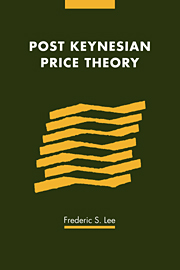Book contents
- Frontmatter
- Contents
- List of figures and tables
- Acknowledgments
- Introduction
- Part I The doctrine of administered prices
- 1 The origin of the doctrine of administered prices: from the modern corporation to industrial prices
- 2 Gardiner Means' doctrine of administered prices
- 3 Developments in the doctrine of administered prices
- Part II The doctrine of normal cost prices
- Part III The doctrine of mark up prices
- Part IV The grounded pricing foundation of Post Keynesian price theory
- Appendix A Studies on cost accounting and costing practices
- Appendix B Studies on pricing
- Bibliography
- Index
1 - The origin of the doctrine of administered prices: from the modern corporation to industrial prices
Published online by Cambridge University Press: 22 September 2009
- Frontmatter
- Contents
- List of figures and tables
- Acknowledgments
- Introduction
- Part I The doctrine of administered prices
- 1 The origin of the doctrine of administered prices: from the modern corporation to industrial prices
- 2 Gardiner Means' doctrine of administered prices
- 3 Developments in the doctrine of administered prices
- Part II The doctrine of normal cost prices
- Part III The doctrine of mark up prices
- Part IV The grounded pricing foundation of Post Keynesian price theory
- Appendix A Studies on cost accounting and costing practices
- Appendix B Studies on pricing
- Bibliography
- Index
Summary
Gardiner Means was born on June 8, 1896 in Windham, Connecticut, and spent his pre-college days growing up in Massachusetts and Maine. He entered Harvard in 1914 and majored in chemistry, and with the outbreak of war in 1917 he enlisted in the army. In 1919 he joined the Near East Relief, and after completing his stint, Means entered Lowell Textile School in September 1920, a decision prompted by his experience of hand-weaving in Turkey. After two years of studying wool manufacturing, he left in March 1922 to set up a textile enterprise making a highquality (and high-priced) woven blanket of his own design that was quite different to any made by other blanket manufacturers. Through the running of his business enterprise, Means became well acquainted with the Boston wool market and the textile machinery market, and quickly came to the conclusion that American industrial life was very different than what he had experienced in the oriental bazaar in Harput. In particular, Means found that while the prices of cotton and wool varied continuously as in a bazaar, the prices of cotton and wool yarns did not. He thus deduced that the pricing process for the yarns was significantly different from the pricing process for cotton and wool. Means also found himself setting his price prior to any transaction in the market and then engaging in many sequential transactions at this price.
- Type
- Chapter
- Information
- Post Keynesian Price Theory , pp. 19 - 43Publisher: Cambridge University PressPrint publication year: 1999

